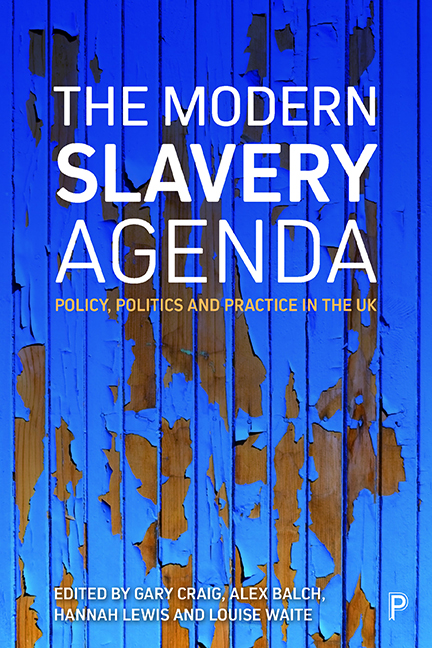Book contents
- Frontmatter
- Dedication
- Contents
- List of tables, figures and boxes
- Notes on contributors
- Editorial introduction: the modern slavery agenda: policy, politics and practice
- one Modern slavery in global context: ending the political economy of forced labour and slavery
- two The UK’s response to modern slavery: law, policy and politics
- three Defeating ‘modern slavery’, reducing exploitation? The organisational and regulatory challenge
- four Class Acts? A comparative analysis of modern slavery legislation across the UK
- five Child trafficking in the UK
- six Human trafficking: addressing the symptom, not the cause
- seven Still punishing the wrong people: the criminalisation of potential trafficked cannabis gardeners
- eight Modern slavery and transparency in supply chains: the role of business
- nine Migrant illegality, slavery and exploitative work
- ten The UK’s approach to tackling modern slavery in a European context
- Index
five - Child trafficking in the UK
Published online by Cambridge University Press: 20 April 2022
- Frontmatter
- Dedication
- Contents
- List of tables, figures and boxes
- Notes on contributors
- Editorial introduction: the modern slavery agenda: policy, politics and practice
- one Modern slavery in global context: ending the political economy of forced labour and slavery
- two The UK’s response to modern slavery: law, policy and politics
- three Defeating ‘modern slavery’, reducing exploitation? The organisational and regulatory challenge
- four Class Acts? A comparative analysis of modern slavery legislation across the UK
- five Child trafficking in the UK
- six Human trafficking: addressing the symptom, not the cause
- seven Still punishing the wrong people: the criminalisation of potential trafficked cannabis gardeners
- eight Modern slavery and transparency in supply chains: the role of business
- nine Migrant illegality, slavery and exploitative work
- ten The UK’s approach to tackling modern slavery in a European context
- Index
Summary
Introduction
Child trafficking has been noted to have a ‘lower profile’ than that of adult trafficking (Annison 2013a). However, numbers of recorded child victims are more than a third of the total of those identified in the UK by relevant authorities. Trafficked children have ‘particular vulnerabilities’, as recognised by the European Union (EU) Anti-Trafficking Directive, and this chapter will explore those specific needs and examine the UK's response to children who have been exploited. It will look at whether the National Referral Mechanism (NRM) works effectively for children and it will assess how current policy/practice impacts on this affected group.
Definitions and offences
The United Nations Convention on the Rights of the Child defines a child as being an individual who is under the age of 18. According to the internationally accepted definition of human trafficking, child trafficking means the ‘recruitment, transportation, transfer, harbouring or receipt of persons … for the purpose of exploitation’. It defines exploitation as, ‘at a minimum, the exploitation of the prostitution of others or other forms of sexual exploitation, forced labour or services, slavery or practices similar to slavery, servitude or the removal of organs’ (Article 3 of the [Palermo] ‘Protocol to prevent, suppress and punish trafficking in persons especially women and children’, supplementing the United Nations Convention against Transnational Organized Crime, adopted by General Assembly resolution 55/25 of 15 November 2000; see UNODC 2003).
A more expanded explanation of exploitation can be found in the EU Anti-Trafficking Directive (Preamble, para 11, Directive 2011/36/EU of the European Parliament and of the Council of 5 April 2011 on preventing and combating trafficking in human beings and protecting its victims, and replacing Council Framework Decision 2002/629/ JHA):
In order to tackle recent developments in the phenomenon of trafficking in human beings, this Directive adopts a broader concept of what should be considered trafficking in human beings than under Framework Decision 2002/629/JHA and therefore includes additional forms of exploitation. Within the context of this Directive, forced begging should be understood as a form of forced labour or services as defined in the 1930 ILO Convention No 29 concerning Forced or Compulsory Labour.
- Type
- Chapter
- Information
- The Modern Slavery AgendaPolicy, Politics and Practice in the UK, pp. 121 - 144Publisher: Bristol University PressPrint publication year: 2019



